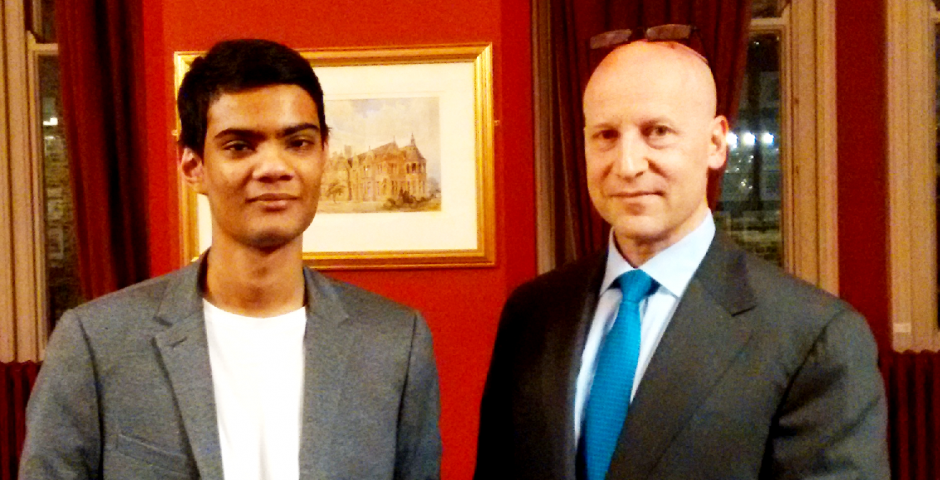
Daniel Levin: ‘There are really three different tracks of diplomacy going on’
Strategy advisor and foreign affairs expert Daniel Levin on the way diplomacy REALLY works.
Daniel Levin is, to say the least, an unusual man.
He’s a consummate insider with impeccable ‘establishment’ credentials; a career spent within think tanks and government institutions, now helping run the Liechtenstein Foundation for State Governance, where he advises on diplomacy, mediation and governance. But despite living in this rarefied world, he’s also a startlingly frank critic of it.
He’s come to the Cambridge Union to talk about his latest book – ‘Nothing But a Circus: Misadventures Among the Powerful’ – in which he recounts his encounters with various members of the ‘elite’ over the course of his career. The clue’s in the title; largely, he seems unimpressed with the people who wield so much influence in modern society.
Levin talks about his experience in Angola, where he was brought in to handle political mediation in the aftermath of the civil war there. Also on the ground were a variety of other organisations; NGOs, banks and others. This was the beginning of his awakening, so to speak; he talks of how ‘I got humbled, because I realised how much these financial initiatives – World Bank or McKinsey initiatives – do not work.’
The people responsible for these failures can’t even use idiocy as an excuse, according to Levin. For the most part, he describes them as being far more interested in self-enrichment than in actually doing their job. ‘I don’t believe that many of those characters [in the book] are stupid…they can be very good at helping themselves. It’s a bit like going in for brain surgery, and finding out that the person about to do the surgery is a plumber.’

All for show? Levin thinks so.
Perhaps it’s lucky for us, then, that these people don’t actually get much done. The reality, though, is a bit more murky. Levin argues that there are three ‘tracks’ of governance and diplomacy. ‘Track one is the very formal, stiff kind of diplomacy…very little gets done. Then you have track two, which is the working level of diplomats, foreign officials etc. It’s still fairly scripted, and fairly ineffective. Then you have track three, which is where things actually get done.’
Again Levin’s multi-track analysis of foreign relations comes into play. The current negotiations in Astana between the Syrian regime and the opposition are ‘just a screaming match,’ he says – track one, in other words. Of much more importance are trends such as ‘increased radicalisation in some of the republics of Russia like Chechnya’, or ‘the refugee crisis in Europe’, which will force the hands of the various regional powers and make them move away from seeking a military outcome to the war.
Russia is another country which Levin is particularly interested in, and one which he has considerable experience with. He mentions his encounters with one prominent Russian dissident who abruptly disappears one day. Levin presumes him gone, until he sees him on TV a few years later vocally taking Putin’s side in the Ukraine crisis. Levin characterises Russia’s present foreign policy as ‘payback for NATO’s expansion’, explaining that ‘in 2000, Yeltsin met with Clinton, Madeline Albright and Sandy Berger, and asked for NATO to either stop expanding, or to admit Russia into NATO.’ Neither happened; since 2000, countries from the Baltic to the Balkans have joined the organisation, much to Putin’s chagrin.

Vladimir Putin – making Russia great again?
Levin sees this as a ‘missed opportunity’ lost in the triumphalism of America’s victory in the Cold War. To him, ‘there is a sense in Russia that this period of national humiliation is now over…and it’s now time to reassert Russia as a great empire.’ This explains their forays in Ukraine, Georgia and Syria – a mixture of manifest destiny, and a desire to gain revenge upon NATO.
The day after I speak with Levin, President Trump’s National Security Advisor Michael Flynn resigns over his close contacts with Russian officials, amid rumours of kompromat which they might have on him. Clearly the rivalry between Russia and NATO isn’t going away anytime soon.
If Russia has made some good geopolitical calculations over the last few years, Levin is insistent that America hasn’t. Speaking about Obama’s record in particular, he says that ‘certainly in terms of the armed conflicts we’ve seen in the Middle East – whether Libya or Syria – it has to be described as a failure. Anything else would be trite.’ Notwithstanding his comments on the increasing likelihood of a negotiated solution, he says that ‘the odds of any kind of happy outcome [in Syria] are really, really low.’ It’s a bleak reminder of the state of foreign affairs in the world today.

The Tab and Daniel Levin, one looking considerably more formal than the other – Credit Freddie Dyke
Perhaps the most important message of Levin’s is that, beneath the masquerade of pomp and ceremony, diplomacy is fundamentally a question of human interaction. Whether those humans are mysteriously disappearing pseudo-dissidents in Russia, or aid agency executives in London, they are the people who – for better or, more likely, for worse – influence the world we live in.
Not the most comforting thought.









































